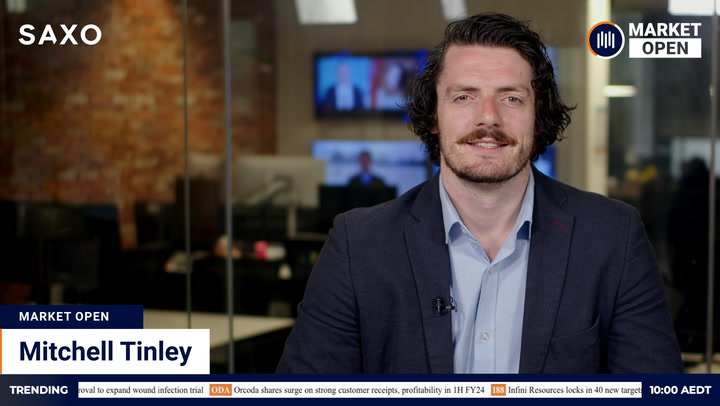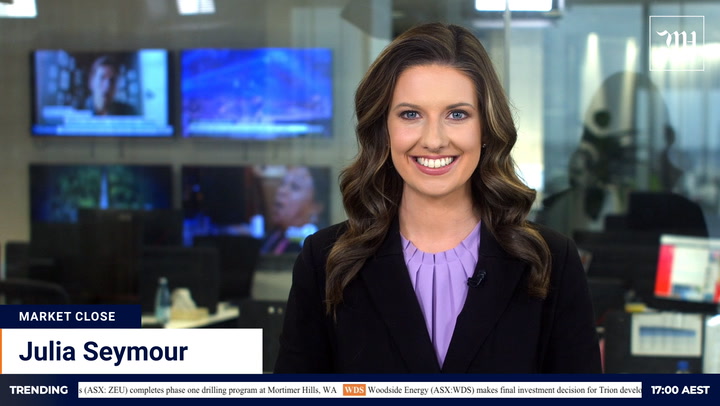The share market closed at its lowest level in three weeks as energy stocks wilted with oil, and rising bond yields sharpened inflation concerns.
The S&P/ASX 200 finished 38 points or 0.56 per cent lower after earlier falling as much as 72 points.
Bargain-hunters stepped in when the sell-off reached a level that has previously attracted buyers. Still, today’s close at 6708 was the weakest since February 26.
What moved the market
The index shed 59 points or around 0.9 per cent across a week dominated by valiant efforts by central banks to douse inflation worries. The RBA and US Federal Reserve reassured investors official interest rates would stay on hold, even as rising bond yields sent conflicting signals.
The yield on ten-year US treasuries hit a 14-month high overnight, triggering a flight from growth stocks whose future earnings dictate their valuations. The Nasdaq Composite tumbled 3.02 per cent. The broader S&P 500 fell 1.48 per cent.
The Australian ten-year yield hit a two-week peak this morning following yesterday’s bumper jobs figures .
“Unfortunately, it’s still all about long term interest rates,” ThinkMarkets analyst Carl Capolingua said. “Last week we had a little pause in the bond market sell-off and rates stabilised. But this week, stronger than expected economic data and a lack of soothing comments from Jerome Powell at the US Federal reserve triggered more bond market selling.
“When bond prices go down, bond yields go up. Higher bond yields increase the cost of borrowing for both companies and consumers, and translate into lower stock valuations, especially for higher growth companies.”
The index trimmed its losses after buyers stepped in below 6680, a level that has twice proved a turning point over the last three weeks. Investors remain torn between concern about the impact on corporate profits of rising costs and optimism about pent-up demand as vaccination programs reinvigorate the global economy.
“Optimistic economic projections continue to push inflation forecasts,” Kalkine Group CEO Kunal Sawhney said. “Decent virus control amid a vaccination drive and dedicated fiscal and monetary support are anticipated to push the US economy to its fastest growth pace in almost four decades.”
The energy sector touched its lowest point in almost a month following a plunge in crude oil. Brent crude skidded 6.9 per cent overnight amid demand worries after much of France returned to lockdown.
Winners’ circle
A mid-morning reverse in some of the banks helped the market trim a heavy initial loss. ANZ and Westpac edged up 0.3 per cent. NAB shed 0.3 per cent and CBA 1.2 per cent.
Goodman Group also overcame early pressure, rising 1.2 per cent as REITs shrugged off the advance in yields. SCA Property Group added 3.8 per cent and Abacus 2.2 per cent. Telstra rose 0.6 per cent to its fifth advance in six sessions.
On the wider ASX 200, just five stocks gained more than 3.5 per cent. Northern Star climbed 4.2 per cent, SCA 3.8 per cent, Altium 3.7 per cent, Harvey Norman 3.6 per cent and Clinuvel Pharmaceutical 3.6 per cent.
The defensive utilities sector was the pick of the sectors. AGL Energy rose 2.2 per cent after striking a five-year deal to supply electricity to Victoria’s Portland aluminium smelter. APA Group gained 0.5 per cent.
Doghouse
The energy sector took the biggest hit, falling 2 per cent to its weakest level in three weeks. Santos declined 2.5 per cent, Oil Search 2.1 per cent and Woodside 3.3 per cent.
“It wasn’t a great session on the ASX today,” Capolingua said. “But, only losing half a per cent or so isn’t too bad when you look at the leads we had from the US, and when you consider the oil price basically crashed overnight. We didn’t follow US stocks on the way up, so there is some feeling that we might be somewhat protected on the way down.”
Yield-sensitive BNPL stocks mostly retreated. Zip Co shed 2.1 per cent and Afterpay 2.4 per cent.
Gold miner Newcrest fell 3.4 per cent, erasing most of yesterday’s advance after gold gave back most of yesterday’s rally. Ore miner BHP lost 1.7 per cent, Rio Tinto 1.6 per cent and Fortescue 1.4 per cent.
Supermarket Coles fell 0.5 per cent after committing to reducing its greenhouse gas emissions by 75 per cent by 2030 and to zero by 2050. Rival Woolworths gained 0.4 per cent.
Other markets
Asian markets struggled as the first summit between China and the Biden administration got off to a turbulent start. Officials exchanged accusations for more than an hour at a photo session scheduled to last four minutes. The Asia Dow gave up 0.74 per cent. China’s Shanghai Composite dropped 1.04 per cent, Hong Kong’s Hang Seng 1.55 per cent and Japan’s Nikkei 1.21 per cent.
US futures inched higher. Dow and S&P 500 futures both climbed around 0.2 per cent.
Oil climbed for the first time in six sessions. Brent crude bounced 19 cents or 0.3 per cent to US$63.47 a barrel. Gold eased $4.80 or 0.3 per cent to US$1,727.90 an ounce.
The dollar stabilised mid-afternoon, reversing early weakness. The Aussie was last up 0.01 per cent at 77.53 US cents.







